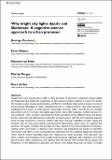Files in this item
Why bright city lights dazzle and illuminate : a cognitive science approach to urban promises
Item metadata
| dc.contributor.author | Cardoso, Rodrigo V | |
| dc.contributor.author | Meijers, Evert J | |
| dc.contributor.author | van Ham, Maarten | |
| dc.contributor.author | Burger, Martijn J | |
| dc.contributor.author | de Vos, Duco | |
| dc.date.accessioned | 2018-11-29T16:30:07Z | |
| dc.date.available | 2018-11-29T16:30:07Z | |
| dc.date.issued | 2019-02-01 | |
| dc.identifier | 255793162 | |
| dc.identifier | 512ceae7-f8d8-4af9-ac2e-96dd18ec0ec5 | |
| dc.identifier | 85059780945 | |
| dc.identifier | 000455388600012 | |
| dc.identifier.citation | Cardoso , R V , Meijers , E J , van Ham , M , Burger , M J & de Vos , D 2019 , ' Why bright city lights dazzle and illuminate : a cognitive science approach to urban promises ' , Urban Studies , vol. 56 , no. 2 , pp. 452-470 . https://doi.org/10.1177/0042098018804762 | en |
| dc.identifier.issn | 0042-0980 | |
| dc.identifier.other | ORCID: /0000-0002-2106-0702/work/64697520 | |
| dc.identifier.uri | https://hdl.handle.net/10023/16580 | |
| dc.description | Funding: This work was funded through a VIDI grant (452-14-004) provided by the Netherlands Organisation for Scientific Research (NWO). | en |
| dc.description.abstract | Despite the many uncertainties of life in cities, promises of economic prosperity, social mobility and happiness have fuelled the imagination of generations of urban migrants in search of a better life. Access to jobs, housing and amenities, and fewer restrictions of personal choices are some of the perceived advantages of cities, characterised here as ‘urban promises’. But while discourses celebrating the triumph of cities became increasingly common, urban rewards are not available everywhere and for everyone. Alongside opportunity, cities offer inequality, conflict and poor living conditions. Their narrative of promise has been persistent across different times and places, but the outcomes and experiences of urban life compare poorly with the overoptimistic expectations of many newcomers. And yet, millions still come and stay regardless of odds, raising the question why we have such positive and persistent expectations about cities. To examine this question, this paper considers the process of urban migration from the perspective of decision-making under uncertainty. It discusses how decisions and evaluations are based on imperfect information and offers a novel contribution by examining how the cognitive biases and heuristics which restrict human rationality shape our responses to urban promises. This approach may allow a better understanding of how people make decisions regarding urban migration, how they perceive their urban experiences and evaluate their life stories. We consider the prospects and limitations of the behavioural approach and discuss how biases favouring narratives of bright urban futures can be exploited by ‘triumphalist’ accounts of cities which neglect their embedded injustices. | |
| dc.format.extent | 19 | |
| dc.format.extent | 383022 | |
| dc.language.iso | eng | |
| dc.relation.ispartof | Urban Studies | en |
| dc.subject | Cognitive biases and heuristics | en |
| dc.subject | Decision-making | en |
| dc.subject | Urban migration | en |
| dc.subject | Social mobility | en |
| dc.subject | Subjective well-being | en |
| dc.subject | Urban triumphalism | en |
| dc.subject | G Geography (General) | en |
| dc.subject | HM Sociology | en |
| dc.subject | T-NDAS | en |
| dc.subject | SDG 10 - Reduced Inequalities | en |
| dc.subject | SDG 11 - Sustainable Cities and Communities | en |
| dc.subject.lcc | G1 | en |
| dc.subject.lcc | HM | en |
| dc.title | Why bright city lights dazzle and illuminate : a cognitive science approach to urban promises | en |
| dc.type | Journal article | en |
| dc.contributor.institution | University of St Andrews. School of Geography & Sustainable Development | en |
| dc.identifier.doi | 10.1177/0042098018804762 | |
| dc.description.status | Peer reviewed | en |
| dc.date.embargoedUntil | 2018-11-28 |
This item appears in the following Collection(s)
Items in the St Andrews Research Repository are protected by copyright, with all rights reserved, unless otherwise indicated.

